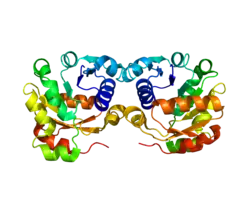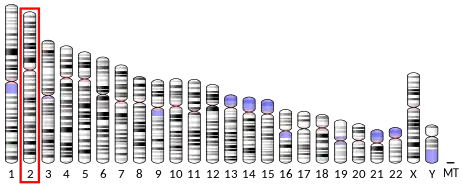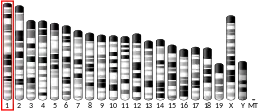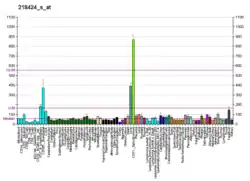STEAP3
Metalloreductase STEAP3 is an enzyme that in humans is encoded by the STEAP3 gene.[5][6]
| STEAP3 | |||||||||||||||||||||||||||||||||||||||||||||||||||
|---|---|---|---|---|---|---|---|---|---|---|---|---|---|---|---|---|---|---|---|---|---|---|---|---|---|---|---|---|---|---|---|---|---|---|---|---|---|---|---|---|---|---|---|---|---|---|---|---|---|---|---|
 | |||||||||||||||||||||||||||||||||||||||||||||||||||
| |||||||||||||||||||||||||||||||||||||||||||||||||||
| Identifiers | |||||||||||||||||||||||||||||||||||||||||||||||||||
| Aliases | STEAP3, AHMIO2, STMP3, TSAP6, dudlin-2, dudulin-2, pHyde, STEAP3 metalloreductase | ||||||||||||||||||||||||||||||||||||||||||||||||||
| External IDs | OMIM: 609671 MGI: 1915678 HomoloGene: 10084 GeneCards: STEAP3 | ||||||||||||||||||||||||||||||||||||||||||||||||||
| |||||||||||||||||||||||||||||||||||||||||||||||||||
| |||||||||||||||||||||||||||||||||||||||||||||||||||
| |||||||||||||||||||||||||||||||||||||||||||||||||||
| |||||||||||||||||||||||||||||||||||||||||||||||||||
| |||||||||||||||||||||||||||||||||||||||||||||||||||
| Wikidata | |||||||||||||||||||||||||||||||||||||||||||||||||||
| |||||||||||||||||||||||||||||||||||||||||||||||||||
STEAP3 is a metalloreductase, capable of converting iron from an insoluble ferric (Fe3+) to a soluble ferrous (Fe2+) form.[7]
STEAP3 and other STEAP protein, with the exception of STEAP1, are predicted to contain a Di-nucleotide binding domain (Rossmann Fold). This has been shown using X-ray crystallography in the cases of STEAP3 and STEAP4 (PDB: 2VNS, 2VQ3 and 2YJZ).[8][9]
References
- GRCh38: Ensembl release 89: ENSG00000115107 - Ensembl, May 2017
- GRCm38: Ensembl release 89: ENSMUSG00000026389 - Ensembl, May 2017
- "Human PubMed Reference:". National Center for Biotechnology Information, U.S. National Library of Medicine.
- "Mouse PubMed Reference:". National Center for Biotechnology Information, U.S. National Library of Medicine.
- Passer BJ, Nancy-Portebois V, Amzallag N, Prieur S, Cans C, Roborel de Climens A, Fiucci G, Bouvard V, Tuynder M, Susini L, Morchoisne S, Crible V, Lespagnol A, Dausset J, Oren M, Amson R, Telerman A (March 2003). "The p53-inducible TSAP6 gene product regulates apoptosis and the cell cycle and interacts with Nix and the Myt1 kinase". Proceedings of the National Academy of Sciences of the United States of America. 100 (5): 2284–9. Bibcode:2003PNAS..100.2284P. doi:10.1073/pnas.0530298100. PMC 151332. PMID 12606722.
- "Entrez Gene: STEAP3 STEAP family member 3".
- Ohgami RS, Campagna DR, McDonald A, Fleming MD (August 2006). "The Steap proteins are metalloreductases". Blood. 108 (4): 1388–94. doi:10.1182/blood-2006-02-003681. PMC 1785011. PMID 16609065.
- Sendamarai AK, Ohgami RS, Fleming MD, Lawrence CM (May 2008). "Structure of the membrane proximal oxidoreductase domain of human Steap3, the dominant ferrireductase of the erythroid transferrin cycle" (PDF). Proceedings of the National Academy of Sciences of the United States of America. 105 (21): 7410–5. Bibcode:2008PNAS..105.7410S. doi:10.1073/pnas.0801318105. PMC 2396704. PMID 18495927.
- Gauss GH, Kleven MD, Sendamarai AK, Fleming MD, Lawrence CM (July 2013). "The crystal structure of six-transmembrane epithelial antigen of the prostate 4 (Steap4), a ferri/cuprireductase, suggests a novel interdomain flavin-binding site". The Journal of Biological Chemistry. 288 (28): 20668–82. doi:10.1074/jbc.M113.479154. PMC 3711330. PMID 23733181.
Further reading
- Hartley JL, Temple GF, Brasch MA (November 2000). "DNA cloning using in vitro site-specific recombination". Genome Research. 10 (11): 1788–95. doi:10.1101/gr.143000. PMC 310948. PMID 11076863.
- Wiemann S, Weil B, Wellenreuther R, Gassenhuber J, Glassl S, Ansorge W, Böcher M, Blöcker H, Bauersachs S, Blum H, Lauber J, Düsterhöft A, Beyer A, Köhrer K, Strack N, Mewes HW, Ottenwälder B, Obermaier B, Tampe J, Heubner D, Wambutt R, Korn B, Klein M, Poustka A (March 2001). "Toward a catalog of human genes and proteins: sequencing and analysis of 500 novel complete protein coding human cDNAs". Genome Research. 11 (3): 422–35. doi:10.1101/gr.GR1547R. PMC 311072. PMID 11230166.
- Korkmaz KS, Elbi C, Korkmaz CG, Loda M, Hager GL, Saatcioglu F (September 2002). "Molecular cloning and characterization of STAMP1, a highly prostate-specific six transmembrane protein that is overexpressed in prostate cancer". The Journal of Biological Chemistry. 277 (39): 36689–96. doi:10.1074/jbc.M202414200. PMID 12095985.
- Amzallag N, Passer BJ, Allanic D, Segura E, Théry C, Goud B, Amson R, Telerman A (October 2004). "TSAP6 facilitates the secretion of translationally controlled tumor protein/histamine-releasing factor via a nonclassical pathway". The Journal of Biological Chemistry. 279 (44): 46104–12. doi:10.1074/jbc.M404850200. PMID 15319436.
- Wiemann S, Arlt D, Huber W, Wellenreuther R, Schleeger S, Mehrle A, Bechtel S, Sauermann M, Korf U, Pepperkok R, Sültmann H, Poustka A (October 2004). "From ORFeome to biology: a functional genomics pipeline". Genome Research. 14 (10B): 2136–44. doi:10.1101/gr.2576704. PMC 528930. PMID 15489336.
- Mehrle A, Rosenfelder H, Schupp I, del Val C, Arlt D, Hahne F, Bechtel S, Simpson J, Hofmann O, Hide W, Glatting KH, Huber W, Pepperkok R, Poustka A, Wiemann S (January 2006). "The LIFEdb database in 2006". Nucleic Acids Research. 34 (Database issue): D415-8. doi:10.1093/nar/gkj139. PMC 1347501. PMID 16381901.
This article is issued from Wikipedia. The text is licensed under Creative Commons - Attribution - Sharealike. Additional terms may apply for the media files.




